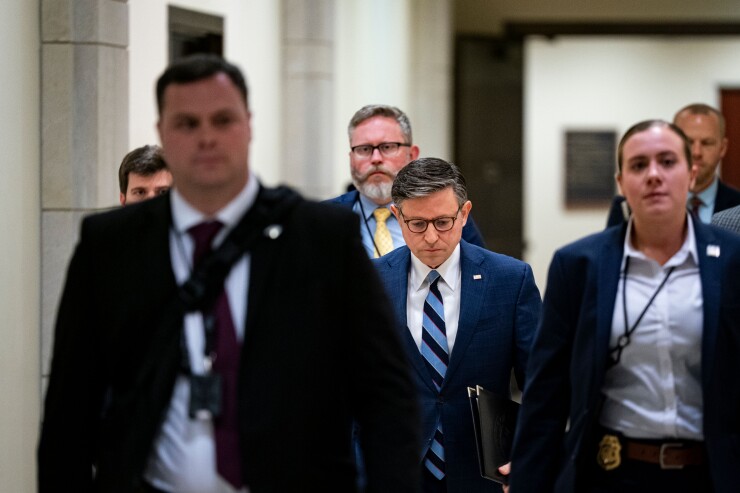Influential conservative groups with deep pockets are pushing Republicans to demand steep concessions from Democrats in exchange for extending health care subsidies, a move that risks prolonging a U.S. government shutdown now in its 20th day.
Activists on the right, including the billionaire Koch family's political arm, are running ads and holding meetings to pressure Republicans to stave off Democrats' demands. If they must negotiate, these groups argue, Republicans should at least leverage any health care talks to score political wins on abortion and other priorities resisted by Democrats.
Their push comes as congressional Republicans are divided over how to handle the expiring Obamacare premium subsidies at the center of the shutdown fight. Democrats have insisted they will not reopen the government until Republicans agree to extend those subsidies to head off a spike in insurance premiums for more than 22 million Americans.
House Speaker Mike Johnson and other GOP leaders are largely united in their opposition to extending the subsidies, but they are also back-channeling with the White House to figure out their own health care proposals. Several in the party, including conservative populist Marjorie Taylor Greene, have already broken ranks to criticize the potential insurance premium increases, which will disproportionately impact Republican-led congressional districts.
Conservative stalwarts like Grover Norquist of the anti-tax group Americans for Tax Reform, who have long opposed Obamacare and view the COVID-era subsidies as costly handouts, are determined to make sure the attention Democrats have focused on the expiring subsidies doesn't weaken Republican will.
"If you look at the base, all the center-right groups and structures are opposed to any compromise or any extension at all," said Norquist, whose group leads the weekly conservative strategy meetings. "There's no reason to fold."
But a
Without the subsidies, out-of-pocket insurance premium payments will more than double, on average, for the 22 million Americans who qualify for the current tax credits, according to a KFF analysis.
Conservatives are armed with their own polling, which shows
Americans for Prosperity, a free market group funded by the Koch family, is
"When people understand they were put in during COVID, when the government shut down the economy, and now we're back to a post-COVID normal economy, they recognize we definitely shouldn't make it a permanent growth of government," said Club for Growth president David McIntosh.
As the shutdown drags on, however, Republicans are beginning to have quiet, informal conversations about what a compromise would look like. Steve Scalise, the No. 2 Republican in the House, said congressional leaders are communicating with the White House about the issue. Representative Brian Fitzpatrick, a moderate Republican from Pennsylvania, said White House Director of Legislative Affairs James Braid has been engaging with House Republicans on the subsidies, adding that there have been "a lot of phone calls going on."
Although they'd prefer no compromise, conservative advocates are seeking to establish a series of red lines limiting any potential renewal of the subsidies. One of the key asks will be more stringent restrictions on the use of premium subsidies to pay for Obamacare plans that cover abortion.
"If Republicans do not insist on this, there will be revolt in the pro-life community," said Ryan Ellis, president of the Center for a Free Economy.
Among the proposals is one that would require Obamacare plans in states that cover abortion to bill customers separately for the abortion coverage.
Abortion has long been one of the most contentious issues in the Obamacare debate. The Affordable Care Act prohibits federal funds from being used to pay for abortion but conservatives argue there are loopholes that allow states to redirect federal funds toward that purpose.
Conservative advocates and Republican lawmakers are preparing other ideas to constrain health subsidies including a new provision that would require low-income families whose premium credits would otherwise completely cover the cost of an insurance policy to be required to make a minimum monthly payment.
The Paragon Institute, a small but powerful conservative health-care think tank run by a former Trump official, portrays the minimum monthly payments as an anti-fraud measure to prevent insurance companies from luring customers onto "zero-cost" policies.
"If you're worried about fraud, you have to require a minimum individual contribution toward premiums," said Ryan Long, Paragon's director of congressional relations.
Another idea circulating is one that would pair renewal of the subsidies with an expansion of health savings accounts, tax-advantaged accounts for medical costs that are favored by conservatives.
AnneMarie Schieber of the Heartland Institute said she is confident Republicans will demand such "free market" reforms in any deal on the Affordable Care Act.
Some activists on the right say they are so confident Republicans will stick to ideological positions anathema to Democrats that they encourage negotiations, if only to show they are destined to fail.
"I do think it's worthwhile to throw things at the wall to see what works and what doesn't," said Lauren Stewart, senior federal affairs liaison with Americans for Prosperity. "We're all for reopening the government and then looking for agreement on health care reforms that will actually lower costs, but I believe any extension of these enhanced subsidies is going to remain a non-starter."






